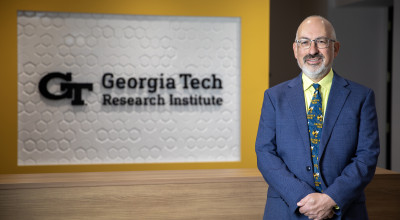
Dr. Jon Duke is the director of the Center for Health Analytics and Informatics at the Georgia Tech Research Institute (GTRI) and a principal research scientist at the School of Interactive Computing in the College of Computing. He began working at Georgia Tech in 2016. His career before Tech was entirely in medical environments, both as a physician and a researcher.
At Georgia Tech his research focuses on advancing techniques for identifying patients of interest from different data sources with applications spanning research, quality, and clinical domains.
“Explaining health informatics and healthcare to someone who does not spend their time in that world is definitely a challenge. I’m certain that my mom would say she still doesn’t know what I do,” he joked. “I describe it like this. Health analytics is all about making sure that people have the information they need to make decisions about health. Sometimes the person is a patient. At other times it’s a doctor, an executive at a health system, a policymaker, or a public health official.”
Dr. Duke and his fellow researchers look at data from a variety of sources in different formats. For example, health information may come in as billing codes, doctors’ notes, or patient responses to a question like, “How do you feel today?” The answer can go in many different directions, so the researchers must apply different technologies to pull the data together in a harmonious manner that can be analyzed and communicated effectively.
His current projects include work with the Centers for Disease Control and Prevention (CDC), addressing a variety of illnesses from Covid-19 to chronic diseases.
“Getting to work on challenging problems that have really affected people’s lives is extremely rewarding,” he said. “We are an applied research shop, so balancing new innovations with improving existing approaches is always a challenge.”
Dr. Duke has been a member of Georgia Tech’s Covid-19 Recovery Task Force since March 2020.
“Throughout my time on the task force I have been impressed by how much expertise Georgia Tech has brought to bear on everything from epidemiology and vectors of transmission to vaccine logistics and communications,” he said. “How many places can bring together that type of expertise? I’m so very privileged to be here.”
Duke, who grew up in Atlanta, has a bachelor’s degree from Emory University, a master’s degree in human-computer interaction from Indiana University, and a medical degree from Harvard Medical School. He speaks Japanese, and when he was in medical practice he had several hundred Japanese patients.
“People are sometimes surprised to hear that I speak Japanese. I was a history major in college and I studied a lot of Japanese history. I also spent time in Japan in college, and I lived there for a while after college,” he said.
Away From the Office
When he isn’t working, Duke enjoys exploring the city on his bike, writing a novel with his wife, and playing chess with his children.
“We live in Midtown, and a stretch of the BeltLine goes behind our street,” he said. “There’s a string of parks, designed by Frederick Law Olmsted, going through Decatur. I’ve driven down Ponce de Leon Avenue a hundred times, but it’s amazing to bike through the parks.”
In November 2019 he and his wife started writing a novel as part of National Novel Writing Month. Coincidentally, the novel was about a pandemic and its impact.
“We had to change a lot of things about the story because reality caught up with us and it seemed a little too on the nose at this point,” he said. “It’s been fun to do something together like that. Hopefully, we’ll finish it this year.”
He also plays chess with his 7-year-old son, who was given a book on chess at the beginning of the social distancing period.
“We started to get into chess, and now he’s better than I am. But I try not to get too depressed about it,” Duke said. “There’s something mentally cleansing about those games. During the pandemic, you have to make your brain work differently by getting off your Zoom brain for a while. It’s been fun playing chess with my kids, but it’s not all chess at our house. We still play a fair amount of Nintendo.”

Writer: Victor Rogers




